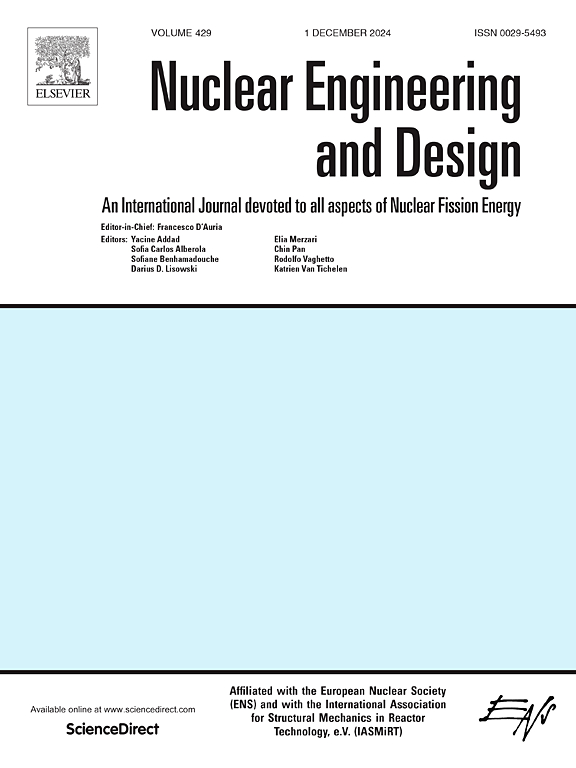High-fidelity forced convection simulations of the University of Wisconsin–Madison air-cooled reactor cavity cooling system
IF 2.1
3区 工程技术
Q1 NUCLEAR SCIENCE & TECHNOLOGY
引用次数: 0
Abstract
Among the various types of advanced nuclear technologies that exist, high-temperature gas-cooled reactors (HTGRs) stand out for their co-generation capabilities and exceptional passive safety systems. HTGRs rely on a reactor cavity cooling system (RCCS) to remove decay heat from the reactor pressure vessel (RPV) during the course of long-term transients. Several studies have focused on experimental and numerical modeling of the RCCS; however, the literature reveals a notable gap when it comes to high-fidelity simulations such as direct numerical simulations (DNS) or large eddy simulation (LES) models of the RCCS. An LES model was developed for forced convection inside the RCCS so as to obtain a high-fidelity representation of the RCCS at a scale never before attempted. The LES model was compared against three different Reynolds-averaged Navier–Stokes (RANS) models (Realizable , SST, and Reynolds stress model [RSM]). This comparison verified the robustness and accuracy of the turbulence modeling approach of the RANS models for the RCCS. Finally, based on the comparison between the LES and the RANS models, the SST RANS model of the experimental facility was developed and compared against the available experimental data.
威斯康星大学麦迪逊分校气冷反应堆空腔冷却系统的高保真强迫对流模拟
在现有的各种先进核技术中,高温气冷堆(htgr)因其热电联产能力和卓越的被动安全系统而脱颖而出。htgr依靠反应堆腔冷却系统(RCCS)在长期瞬态过程中从反应堆压力容器(RPV)中去除衰变热。一些研究集中在RCCS的实验和数值模拟上;然而,当涉及到RCCS的直接数值模拟(DNS)或大涡模拟(LES)模型的高保真度模拟时,文献显示出明显的差距。为了在从未尝试过的尺度上获得RCCS的高保真表现,建立了RCCS内部强迫对流的LES模型。将LES模型与三种不同的Reynolds-average Navier-Stokes (RANS)模型(Realizable k−ε、k−ω SST和Reynolds应力模型[RSM])进行比较。这一对比验证了RANS模型对RCCS湍流建模方法的鲁棒性和准确性。最后,在比较LES和RANS模型的基础上,建立了实验设施的k−ω SST RANS模型,并与现有实验数据进行了比较。
本文章由计算机程序翻译,如有差异,请以英文原文为准。
求助全文
约1分钟内获得全文
求助全文
来源期刊

Nuclear Engineering and Design
工程技术-核科学技术
CiteScore
3.40
自引率
11.80%
发文量
377
审稿时长
5 months
期刊介绍:
Nuclear Engineering and Design covers the wide range of disciplines involved in the engineering, design, safety and construction of nuclear fission reactors. The Editors welcome papers both on applied and innovative aspects and developments in nuclear science and technology.
Fundamentals of Reactor Design include:
• Thermal-Hydraulics and Core Physics
• Safety Analysis, Risk Assessment (PSA)
• Structural and Mechanical Engineering
• Materials Science
• Fuel Behavior and Design
• Structural Plant Design
• Engineering of Reactor Components
• Experiments
Aspects beyond fundamentals of Reactor Design covered:
• Accident Mitigation Measures
• Reactor Control Systems
• Licensing Issues
• Safeguard Engineering
• Economy of Plants
• Reprocessing / Waste Disposal
• Applications of Nuclear Energy
• Maintenance
• Decommissioning
Papers on new reactor ideas and developments (Generation IV reactors) such as inherently safe modular HTRs, High Performance LWRs/HWRs and LMFBs/GFR will be considered; Actinide Burners, Accelerator Driven Systems, Energy Amplifiers and other special designs of power and research reactors and their applications are also encouraged.
 求助内容:
求助内容: 应助结果提醒方式:
应助结果提醒方式:


